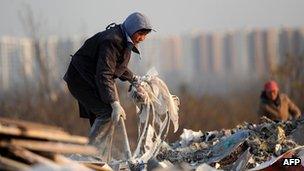China promises rise in minimum wage to close income gap
- Published

China has approved a plan to tackle the widening income gap between rich and poor, which includes raising its minimum wage.
The minimum wage would increase to 40% of average urban salaries by 2015.
State-owned firms would also need to give a greater share of their profits to the government, which it said it would use to fund social security.
The widening wealth gap in China has stoked concerns over its impact on political and social stability.
China's Gini coefficient, which is a gauge of income disparity in a country, rose to 0.474 in 2012, higher than the 0.4 level analysts often cite as a threshold for potential social unrest.
However, some analysts were sceptical whether the proposals will work.
"The plan suggests the government puts more weight on income growth than on income distribution," said Zhang Zhiwei, chief China economist at Nomura.
He explained that the proposal did not set an "explicit target" for Gini coefficient but offered only an objective to "reduce population in poverty and increase size of middle class".
"This probably reflects the difficulty the government expects to have in reducing income inequality and the strong resistance from vested interest groups," he said.
Mr Zhiwei added that the Chinese government had announced reform plans in the past but the implementation of those plans had not been effective.
Other proposals announced in the plan include steps to boost incomes of farmers; improving the health care system; increasing supply of affordable housing; a ceiling on salaries of senior management at state-owned firms and strengthening tax regulations.
'Arduous and complicated'
China's robust economic expansion in recent years has seen income levels rise, especially in urban areas, giving rise to an affluent middle class.
However, there have been concerns that China economic rise has not benefited everyone, with many people in rural areas still living below the poverty line.
According to the People's Daily, almost 128 million people in rural areas were defined as poor, or having an annual per capita income of less than 2300 yuan ($368; £235) in 2011.
The widening wealth gap has resulted in growing calls for government action.
Analysts have long said that rising income levels in rural areas are key not only to social stability but also to China's efforts to boost domestic consumption and sustain long term economic growth.
China has been trying to stoke domestic demand in an attempt to rebalance its economy and to offset a decline in demand for its exports, which have been hurt by a slowdown in key markets such as the US and Europe.
The cabinet said its latest plan was targeted at lifting as many as 80 million people out of poverty by 2015.
It added that it would work towards doubling the average real income of both rural and urban residents by 2020, from the 2010 levels.
However, it said that a significant reduction in the wealth gap was likely to take some time.
"Deepening the income distribution reform is a systematic project that is arduous and complicated and concerns the reallocation of various interests," the cabinet said.
"There is no way to accomplish it overnight."
- Published1 November 2012
- Published1 November 2012
- Published16 October 2012